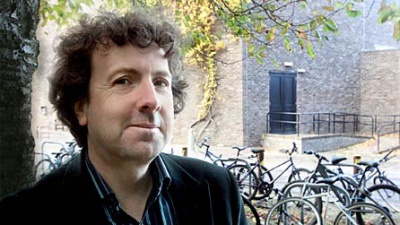The 3rd Degree
(→Synopsis) |
|||
| Line 18: | Line 18: | ||
<div class="image">[[File:3rddegree stevepunt.jpg|400px]]''A middle-aged man hanging around the bike sheds. It's alright, he's with the BBC.''</div> | <div class="image">[[File:3rddegree stevepunt.jpg|400px]]''A middle-aged man hanging around the bike sheds. It's alright, he's with the BBC.''</div> | ||
| - | These specialist rounds alternate with general knowledge rounds. The opening round is one question to each contestant in turn; the closing round is the traditional buzzer round. There's also a "name things in a given category against the clock" round, and most interestingly the "Highbrow - Lowbrow" round. In this, a category is read out, for which there are two questions, one "highbrow", the other... yes, you're ahead of us here. Without hearing the questions, the contestant has to choose whether they will answer the highbrow question and leave the lowbrow one to their opponent, or vice versa. Students score 1 point for a lowbrow question and 2 for a highbrow, but for the tutors it's the other way round. Not only does this make for an interesting twist on the traditional "home or away" choice (because you're selecting "home or away" on behalf of both yourself and your opponent, knowing that correct answers from both of you will effectively cancel out) but it's also a much more convincing application of the "highbrow meets lowbrow" concept than the last show to try it: where [[The Deadly Knowledge Show]] talked the talk, ''The 3rd Degree'' walks the walk. Slightly falteringly perhaps, but credit where it's due. | + | These specialist rounds alternate with general knowledge rounds. The opening round is one question to each contestant in turn; the closing round is the traditional buzzer round. There's also a "name things in a given category against the clock" round, and most interestingly the "Highbrow - Lowbrow" round. In this, a category is read out, for which there are two questions, one "highbrow", the other... yes, you're ahead of us here. Without hearing the questions, the contestant has to choose whether they will answer the highbrow question and leave the lowbrow one to their opponent, or vice versa. Students score 1 point for a lowbrow question and 2 for a highbrow, but for the tutors it's the other way round. Not only does this make for an interesting twist on the traditional "home or away" choice (because you're selecting "home or away" on behalf of both yourself and your opponent, knowing that correct answers from both of you will effectively cancel out) but it's also a much more convincing application of the "highbrow meets lowbrow" concept than the last show to try it: where [[The Deadly Knowledge Show]] talked the talk, ''The 3rd Degree'' walks the walk. Slightly falteringly perhaps, but credit where it's due. |
| + | |||
| + | ==Trivia== | ||
| + | |||
| + | The students didn't win a single match in the first series, but did manage one tie. | ||
==Theme music== | ==Theme music== | ||
Revision as of 23:00, 30 March 2011
Synopsis
Quiz pitting teams of three university students against their own tutors, or to put it another way, teams of people too young to remember Beat the Teacher against teams of people old enough to recall it, but who probably don't, what with having far more important things on their minds.
The rounds are a mix of "tough general knowledge" (to borrow a phrase that only one side is likely to have been exposed to before) and specialist rounds. We'll take the latter first: the student and their tutor each face three questions. In an attempt to reduce the tutors' obvious advantage (i.e. they know lots of stuff), unanswered questions can be passed from the tutors to the students for a bonus, but tutors cannot answer the students' questions. Well, they can, but they don't get any points for it.
These specialist rounds alternate with general knowledge rounds. The opening round is one question to each contestant in turn; the closing round is the traditional buzzer round. There's also a "name things in a given category against the clock" round, and most interestingly the "Highbrow - Lowbrow" round. In this, a category is read out, for which there are two questions, one "highbrow", the other... yes, you're ahead of us here. Without hearing the questions, the contestant has to choose whether they will answer the highbrow question and leave the lowbrow one to their opponent, or vice versa. Students score 1 point for a lowbrow question and 2 for a highbrow, but for the tutors it's the other way round. Not only does this make for an interesting twist on the traditional "home or away" choice (because you're selecting "home or away" on behalf of both yourself and your opponent, knowing that correct answers from both of you will effectively cancel out) but it's also a much more convincing application of the "highbrow meets lowbrow" concept than the last show to try it: where The Deadly Knowledge Show talked the talk, The 3rd Degree walks the walk. Slightly falteringly perhaps, but credit where it's due.
Trivia
The students didn't win a single match in the first series, but did manage one tie.
Theme music
For reasons that we're sure must be as obvious to you as they are to us, "Ruby" by Kaiser Chiefs.


